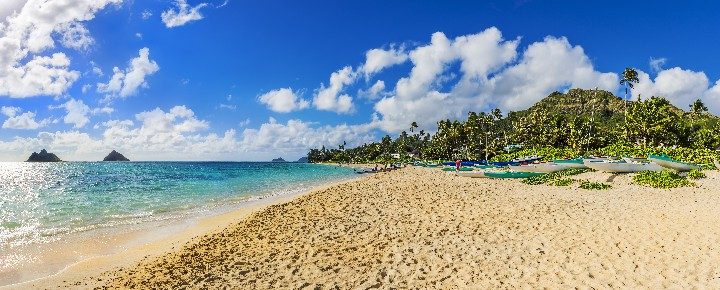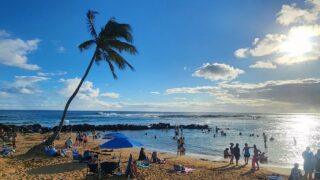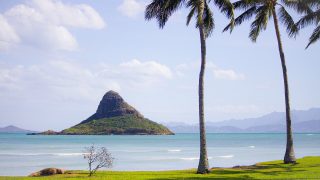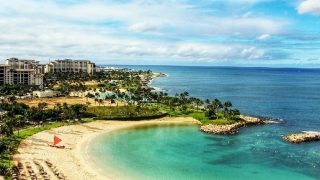The rules are ever-changing for Hawaii vacation rentals, and now it’s the Island of Oahu’s turn. It means that areas like Lanikai seen in the lead photo will no longer be hosting short-term guests. This started when the Honolulu City Council approved a controversial new bill that extends the minimum booking period for some rentals to at least 90 days. That is unless the federal court sees things differently.
What this ordinance will do, in effect, is to eliminate almost all short-term vacation rentals on the island, except for those that are in specific resort zones.
The areas that remain permitted, with rules unchanged, include Waikiki. Also, there are some areas in a number of other Oahu towns that also continue to qualify for short-term rentals. Those are Ewa, Kahala, Koolina, Kuilima, Laie, and Makaha.
So this answers a question posed by one of our readers. Regular commenter Gloria asked, “I believe the 3-month rule is only for new condos…others have been grandfathered in. Beat of Hawaii, can you enlighten us please?” Here’s what we know.
The ordinance is due to go into effect starting October 23, 2022.
1. Those units that previously qualified as minimum 30-day rentals may continue to be rented as-is until April 23, 2023. At that time, all such rentals must either convert to a 90-day minimum or stop renting.
2. Rentals to which this new ruling applies must state: “this property may not be rented for less than 90 consecutive days. Rental prices will not be reduced or adjusted based on the number of days the rental is actually used or occupied.”
3. Vacation rental occupants are required to park on-site and not on public streets near the rentals.
4. The areas in Honolulu where no-minimum stay, true short-term vacation rentals remain permitted, with their rules unchanged, are listed below in purple.
STR_WaikikiThe bill’s language describes the issues being addressed.
“Short-term rentals are disruptive to the character and fabric of our residential neighborhoods, [and] are inconsistent with the land uses that are intended for our residential zoned areas and increase the price of housing for Oahu’s resident population by removing housing stock from the for-sale and long-term rental markets. The City Council finds that any economic benefits of opening up our residential areas to tourism are far outweighed by the negative impacts to our neighborhoods and local residents.”
So not only are rentals being severely limited, but language is mandating that each such extended-stay vacation rental has its own private parking.
It isn’t only some residents that are happy about the planned legislation, but so too are the powerful hotels that are seeking to curtail competition from Airbnb and VRBO.
Towns most affected by the ruling.
Kailua, Lanikai, and North Shore towns, among others, will be among the most impacted and are set to require that visitors stay in authorized hotels and B&Bs. So the rental where President Obama stayed in Kailua during his time in office is no longer going to be short-term. And the Airbnb your editors stayed at once in Kaimuki is the same. Then there was a fall wedding editor Rob performed at a North Shore rental that can no longer do short-term under this law.
Not so fast: Hawaii vacation rentals move to U.S. District Court.
An association formed by rental property owners has gone to federal court to block the enforcement of the new ordinance.
In a lengthy complaint filed in Honolulu’s U.S. District Court, the Hawaii Legal Short-term Rental Alliance claims that the City and County of Honolulu has violated the rights of its members who have been legally renting their properties “for years, and in some cases, decades,” under laws and protections afforded under the Hawaii and U.S. constitutions. The organization says that it represents at least 1,000 rental properties.
The case contends that any legal rental that existed before April 2022 should be “grandfathered,” permitting it to continue operating in perpetuity, as before. “The right to own and rent property is a fundamental right under the United States and Hawaii Constitutions and Plaintiff’s members and others similarly situated have property interests in the ownership and use of their properties, for purposes of vested rights, takings, and due process.”
30-day minimum Hawaii vacation rental law started in 1985.
The law previously established in 1985, sought to ban those Oahu vacation rentals located in non-resort areas, for any rental less than 30 days. The problem was that these units allegedly became unenforceable, with the proliferation of online booking portals like Airbnb and Vrbo. The new law claimed that based on those websites, up to 10,000 new rental units arose on Oahu. These were largely in areas that had very limited hotels.
While a cottage industry started that benefitted renters, homeowners, and others employed in the businesses, there were problems that surfaced as well. Those opposed to these rentals claimed that residential neighborhoods were turned into resort towns, which reduced the already limited local housing stock and eliminated hotel jobs. HTA estimated that 25% of North Shore homes had, for example, been converted into vacation rentals. Influential Hawaii hotels tried to pressure Honolulu into enforcing the 30-day ordinance, which the city said it was incapable of doing.
There may be some exceptions.
Regular commenter Lanell pointed out that there is a list of possible non-conforming exceptions to the new ruling. Those locations are found here: https://www.honolulu.gov/dppstr/approved-strs.html. Thanks Lanell!







Resorts are expensive for a big family you need two rooms just to fit everybody.so its gonna cost double. And not only that the time share harassment that you may go thru is and can be a true money gauging challenge they wont you to go through. And the restaurants around resorts are expensive. vrbo is fun to explore and reasonable prices. and the family stay together and not in separate rooms.
I love this! But know tourists won’t, and short term rental owners won’t be happy. ! I applauded Tahoe for doing this recently (they went to minimum of 30 day rentals for a lot of residential short term rental homes) and my friends who live there have seen a lot of housing open up for residents now (affordable because they are no longer competing.) This will push all the tourists on the islands back to the hotels (where they should be), instead of in residential areas…freeing up streets, parking and traffic on the already poorly maintained roads and potentially freeing up housing at affordable costs for locals.
If they can’t enforce 30 days how are they going to enforce 90 days? Granted the volume is likely smaller.
If we did t have family on Oahu we’d never come because its too expense to stay in your hotels. Especially when you have a large family.
Nice to know Hawaii is being run by big hotels but whatvekse is new. Good luck with that.
Well, mahalo, this may explain why I’m having such difficulty securing a place in Oahu this November! I’ve had the strangest experiences on Airbnb, like hosts ignoring my request to book, ignoring messages, and sometimes upping the price after the 24 hour window expires, but not even offering it to me at the higher price. It seems like a zombie apocalypse hit! LoL I usually I get a positive response within an hour of requesting to book! But the past 5 days I’ve been looking everywhere on the island, hoping someone will respond. I even looked into a treehouse, but that was a 30 day minimum, and the owner told me I could book it for a week on another site, but then he ignored my request there!! Oh I hope this broken system gets fixed.
Another crazy idea brought to you by the Hawaiian Government.
I’m staying tuned to the real estate & housing rental costs becoming affordable for residents when this all goes into effect. Not sure who will be able to purchase them since the majority of families have members earning their salary from the visitor industry. Managing tourism for sustainability of the land & reefs is important. Also, important is the sustainability of the people preserving their incomes to achieve the goal of buying these affordable houses that are to hit the market.
New, Ordiance. Reduce, Travel. To, Hawaii
There are still plenty of lovely places to stay short term.
It just keeps getting better and better.
If I pay Thousands of Dollars to go on a vacation, the last thing I would want to do is have any of those funds being used for me to work while on vacation. Look up the definition of the word “Vacation”!
At what point are these rentals no longer considered tourist stays and no longer subject to hotel taxes? Many years ago, I had a friend who owned a condo in Florida. There, if a rental was for more than 181 days, it was not subject to hotel taxes. He rented it to someone for 181 days, with the condition that they could only really stay there for 90 days, when he would go. There are other residency related concerns, such as when someone needs to get a Hawaii driver’s license and to be subject to Hawaii income tax. If people rent for 90, but only stay for 30, is this really increasing local housing stock or causing a wastage?
I really don’t think lying is ever the good choice.
Amen Peggy! Using “creative” ways to get around rules, or laws, is always a bad idea.
Good Point! Powers that be only care about votes, not common sense
We are going to Oahu in July of ’23 for 1 month. Been promising our 14 year old granddaughter since she was 2! We stayed in Hauula for 1 month back in ’04 & fell in love with Hawaii! I love condos/vacation homes. Refuse to do Airbnb’s! This will make tourism all but vanish, which is what I think locals want. Be careful what you wish for! What person goes on vacation for 3 months at a time? No one I know can afford that or has a job that offers that! Not all of us tourists are rude. I love the islands!
Apparently, they think most of us do.
I’ve had a rough time with Airbnb lately, where do you look for condos and vacation homes? 🙂 Mahalo